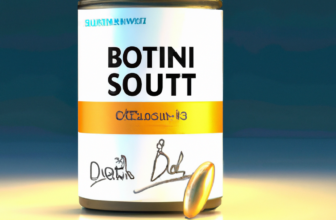Unveiling the Truth: Debunking Biotin Myths and Misconceptions
-
Reading Roadmap
- Unveiling the Truth: Debunking Biotin Myths and Misconceptions
- Key Takeaways
- Introduction: Biotin – A Closer Look
- The Biotin Boom: Myths and Facts
- The Dark Side of Biotin: Potential Risks
- Biotin Deficiency: A Rare Occurrence
- FAQ Section
- 1. Can taking biotin improve my hair, skin, and nails?
- 2. Can biotin help with weight loss?
- 3. Can high levels of biotin interfere with lab tests?
- 4. Is biotin deficiency common?
- 5. Are there any side effects of taking biotin?
- Conclusion: Biotin – A Balanced Perspective
- Further Analysis
- Key Takeaways Revisited
Unveiling the Truth: Debunking Biotin Myths and Misconceptions

[youtubomatic_search]
Key Takeaways
- Biotin is a crucial vitamin for the body, but its benefits are often exaggerated.
- Excessive biotin intake does not necessarily lead to improved hair, skin, and nails.
- High biotin levels can interfere with certain medical tests, leading to inaccurate results.
- Most people get enough biotin from their diet, and deficiency is rare.
- Always consult a healthcare professional before starting a biotin supplement regimen.
Introduction: Biotin – A Closer Look
Biotin, also known as vitamin B7, is a water-soluble vitamin that plays a vital role in the body’s metabolic processes. It’s often touted as a miracle supplement for hair, skin, and nails. However, many myths and misconceptions surround this essential nutrient. This article aims to debunk these myths and provide a clear understanding of biotin’s role in our health.
The Biotin Boom: Myths and Facts
One of the most common misconceptions about biotin is that taking high doses can improve hair growth and strengthen nails. While biotin does play a role in keratin production, a protein that makes up hair, skin, and nails, there’s limited scientific evidence to support the claim that biotin supplements can enhance these features. According to a review published in the Journal of the American Academy of Dermatology, biotin supplementation might only benefit individuals who have a diagnosed biotin deficiency.
Another myth is that biotin can help with weight loss. While biotin is involved in metabolizing fats, proteins, and carbohydrates, there’s no evidence to suggest that taking biotin supplements can boost metabolism or aid weight loss. As stated by the National Institutes of Health, more research is needed to understand biotin’s potential effects on weight.
The Dark Side of Biotin: Potential Risks
Contrary to the belief that “more is better,” excessive biotin intake can lead to potential risks. High levels of biotin can interfere with lab tests, including thyroid and hormone tests, leading to falsely high or low results. This can potentially lead to misdiagnosis and inappropriate treatment. The U.S. Food and Drug Administration (FDA) has issued a safety communication warning about the potential interference of biotin with lab tests.
Moreover, while biotin is generally considered safe, it can cause side effects such as skin rashes, digestive upset, and problems with insulin release and blood sugar control, especially when taken in high doses.
Biotin Deficiency: A Rare Occurrence
Another common misconception is that biotin deficiency is widespread. In reality, biotin deficiency is quite rare. Most people get enough biotin from their diet, as it’s found in a wide variety of foods, including eggs, fish, meat, seeds, nuts, and certain vegetables. The National Institutes of Health states that biotin deficiency is uncommon in the U.S., and it’s usually seen in individuals with genetic disorders that affect biotin metabolism.
FAQ Section
1. Can taking biotin improve my hair, skin, and nails?
While biotin is involved in the health of hair, skin, and nails, there’s limited scientific evidence to support the claim that biotin supplements can enhance these features in healthy individuals.
2. Can biotin help with weight loss?
There’s no evidence to suggest that taking biotin supplements can boost metabolism or aid weight loss.
3. Can high levels of biotin interfere with lab tests?
Yes, high levels of biotin can interfere with certain lab tests, including thyroid and hormone tests, leading to inaccurate results.
4. Is biotin deficiency common?
No, biotin deficiency is quite rare. Most people get enough biotin from their diet.
5. Are there any side effects of taking biotin?
While biotin is generally considered safe, it can cause side effects such as skin rashes, digestive upset, and problems with insulin release and blood sugar control, especially when taken in high doses.
Conclusion: Biotin – A Balanced Perspective
In conclusion, while biotin is an essential nutrient that plays a crucial role in our health, its benefits are often exaggerated. Excessive biotin intake does not necessarily lead to improved hair, skin, and nails, and it can even interfere with certain medical tests. Most people get enough biotin from their diet, and deficiency is rare. Therefore, it’s always best to consult a healthcare professional before starting a biotin supplement regimen.
[youtubomatic_search]
Further Analysis
As we delve deeper into the world of biotin, it’s clear that while it’s an essential nutrient, its role in our health is often misunderstood. By debunking these myths and misconceptions, we can make informed decisions about our health and wellness.
Key Takeaways Revisited
- Biotin is a crucial vitamin for the body, but its benefits are often exaggerated.
- Excessive biotin intake does not necessarily lead to improved hair, skin, and nails.
- High biotin levels can interfere with certain medical tests, leading to inaccurate results.
- Most people get enough biotin from their diet, and deficiency is rare.
- Always consult a healthcare professional before starting a biotin supplement regimen.







